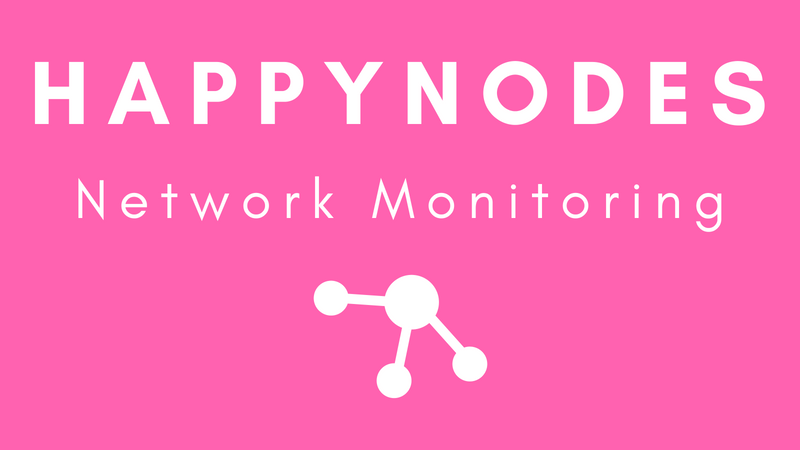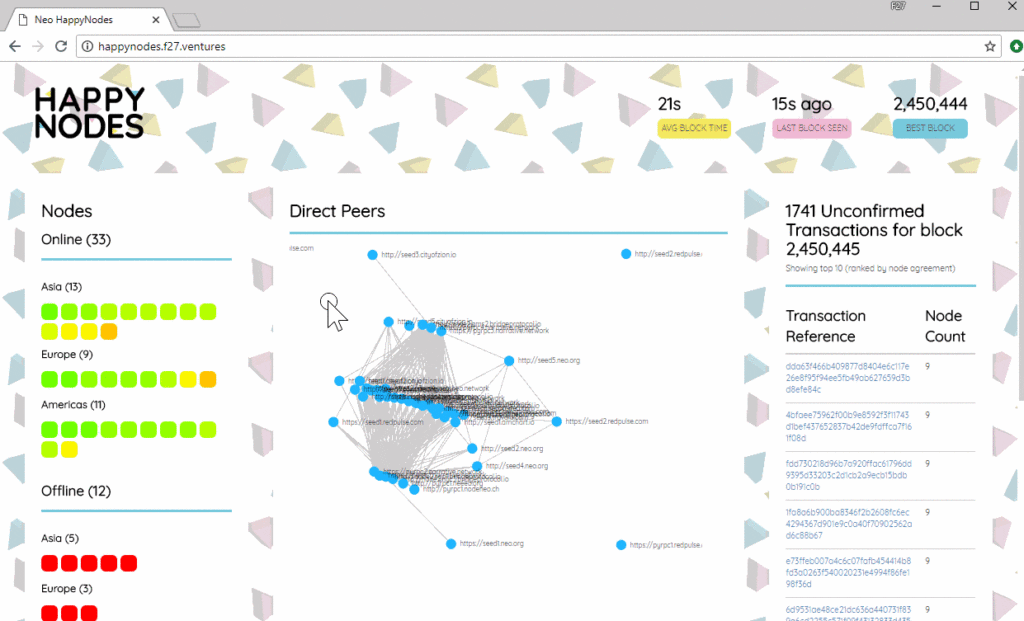
NEO recently announced the winners of the London Blockchain Challenge, which was held on June 17th. The theme of the challenge was “NEO Network State Monitoring.” Over 70 developers registered for the NEO London Blockchain Challenge, with participants coming in from all over Europe.
The London event was the second blockchain challenge held by NEO, with the first being held in Shenzhen earlier in the month. NEO’s blockchain challenges task participants with developing solutions or enhancements to particular problems, with a goal of improving the NEO ecosystem.
The London event called for participants to build a companion network monitor to City of Zion’s neo-mon project. Network monitors keep track of the status of RPC nodes and REST endpoints on the NEO network. These nodes are used by wallets and applications to communicate with the blockchain.
The winner of the challenge was HappyNodes, built by a group called F27, comprised of developers, Wing Chan and Karlson Lee, along with designer, Sharon Chan.
Wing has been coding since he was 12 years old. He studied at Cambridge University where he got a degree in Computer Science with Physics. Wing was involved with NEO and City of Zion in early days of the rebrand from Antshares, creating tutorials for smart contracts. Having spent a period away from the project, the blockchain challenge reignited his interest.
Wing’s friend and colleague, Karlson, who is now the lead developer on HappyNodes, initially wasn’t sure about NEO. However, Wing convinced Karlson to accompany him to the London Blockchain Challenge where he was won over by the technology.
“I had a bit of reservation as my understanding of NEO was not very high at that time. Now I am fully involved in the community and I am grateful for the opportunities the NEO community has given me,” Karlson states.
Karlson graduated from the Imperial College in London with a double degree in Physics and Computer Science. He has spent much of his professional development career at Amberbox, an IoT alarm startup that uses deep learning to tackle gun violence. There, he was developing machine learning models, doing DevOps and building its backend applications. Karlson now focuses on blockchain and machine learning projects through F27.
Rounding off the team was Sharon Chan, Wing’s wife and graphic design student at Shillington College Manchester.
The trio took to the task of improving upon the current City of Zion network monitor in three ways:
The first was to design a cleaner, friendlier, and more intuitive interface, with nodes neatly represented as clickable icons and colour-coded by their health score; the second was to include historical information to identify long-term trends; the third was to include regional grouping, to show how many nodes are in each region (Asia, US, Europe) as an easy way to understand the globalisation of the network.
However, Wing believes that their “killer feature” was the Unconfirmed Transaction feature:
“NEO has block finality which means once a block is created and signed off then that’s that. There’s no waiting for multiple confirmations. However, that does mean at any particular point, there will be lots of valid transactions that are not yet committed to the blockchain. Each node is aware of some of these transactions (as they communicate with each other as to what transactions they’ve seen). We added an unconfirmed transactions tracker to show a real-time view of all the transactions not yet committed to the blockchain but are visible to the nodes. We ranked them by the number of nodes who have also seen it, as that is a good indication that it will be picked up in the next block. As far as we know, this has never been implemented in this way and shared with the community. It was not a mandatory feature or idea from the hackathon, just something we thought up as being a new idea.”

HappyNodes UI
Wing said that the blockchain challenge had a relaxed atmosphere and that it was great to see what all the teams had developed at the end of the day. He also relished the opportunity to meet with other members of the community.
“Peter [Lin] was really good. It was an privilege to meet him at the competition and get a photo. I also met up with Kev who won a prize too. He was on Discord but never met in person. I also met Anthony who won the first CoZ bounty. He was showing people his new solution using the Rust language.”
In addition to winning 600 GAS, HappyNodes is now being supported as an official NEO Global Development project. A six month roadmap covering July through to December has already been published by F27, which includes improvements to API architecture, the addition of consensus monitoring, translation support and improved visualisation.
Additional prizes from the blockchain challenge went to State of NEO in second place (375 GAS), Polymon in third place (150 GAS), with Kev (40 GAS) and Infinity NEO (20 GAS) taking home the consolation prizes.
Peter Lin, NGD R&D Director was very happy with the ideas and solutions delivered by the teams that attended the challenge.
“The challenge is a satisfactory and influential one. On the one hand, we’ve got solutions we want; on the other, ‘Think, Learn, Create’ — the keynote of the event has been played to the fullest. The challengers coming afar also indicates the liveness of the community. The challenge offered developers an opportunity to exchange ideas and brought the developer community closer to us. We’re honored to give back to the community by such means, which we deem as a healthy way to maintain the sustainability of NEO ecosystem.”
HappyNodes can be found at https://happynodes.f27.ventures/ or you can visit the GitHub at https://github.com/neo-ngd/Happynodes







About The Author: Dean Jeffs
Dean is a digital project manager who has worked extensively with start ups and agencies in the marketing space. Fascinated by the potential applications of blockchain technology, Dean has a passion for realising the new smart economy.
More posts by Dean Jeffs